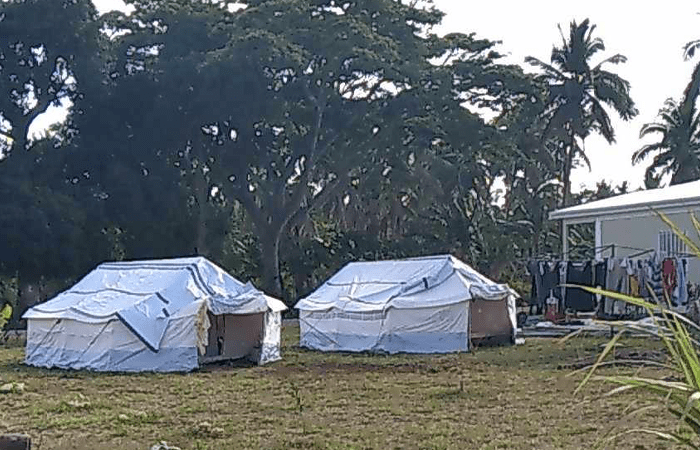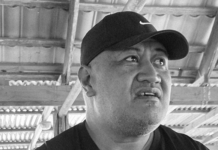The government has no plans to build houses for the tsunami victims now living in tents at ‘Atatā Si’i.

As Kaniva News reported recently, a group of people who survived the tsunami had been living in a church hall, even while other people from the original village of ‘Atatā had been moved into new houses.
They were recently ordered by the government to move to ‘Atatā Si’i and live in tents.
Deputy Prime Minister Samiu Vaipulu told the Legislative Assembly the houses of the 19 families who were moved to ‘Atatā Si’i had not been damaged by the tsunami.
Hon. Vaipulu said the assessment report for the reconstruction projects was based on those whose houses had been damaged. He told the House the ‘Atatā Si’i estate holder had provided land for the tsunami victims and that the government was looking for funding.
“Leave it for the government to figure out what to do for these people.,” Hon. Vaipulu said.
He said the estate holder has given land for the people, but the government was looking for funding.
Former Finance Minister Dr ‘Aisake Eke asked Vaipulu to confirm when the people living in tents would have houses built if they had been given land.
The Deputy Prime Minister said if money could be photocopied the houses would have already been built.
Responding, Hon. Eke told Vaipulu he had seen the budget and there was enough money to build the few houses needed. He said the people who had been told to live in tents did not know what the government panned for them.
He said he was baffled by the government’s plan to exclude these people from the government’s tsunami rebuilding plans as the island was in a “red zone”. Hon. Eke said these people should not be allowed to go back to ‘Atatā. He questioned why the government considered returning them to the island.
“They saw the deadly wave,” he said, referring to the devastating experience they faced on the day the tsunami struck the island.
“These people did not want to return” to ‘Atatā, Hon. Eke said.
The victims were described as living in a state of constant apprehension (“nofo ‘i lelenga”). The House was told the people had faced problems while living in the hall, including at one stage having the electricity disconnected. It is understood the power bills were paid by the government’s National Emergency Management Organisation (NEMO).
The Deputy Prime Minister scolded NEMO in the House for failing to make sure the power bills were paid. The House was also told these Atatāans had often fallen out with the owner of the hall, which was the Siasi ‘O Tonga church.
Hon. Eke accused the government of failing to make sure these people were living harmoniously with the owners of the hall.
MP Tevita Puloka said one of the reasons these people were still living in Tongatapu was because there was no more school in the island.
The ‘Atatā people were first evacuated to ‘Isileli in Kolomotu’a and lived there temporarily before being moved to the Maliukuonga hall of the Siasi ‘o Tonga at Kapetā, Kolomotu’a.







